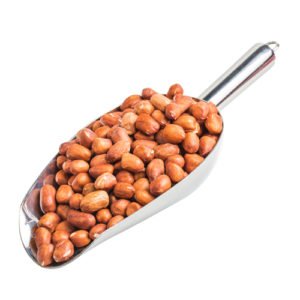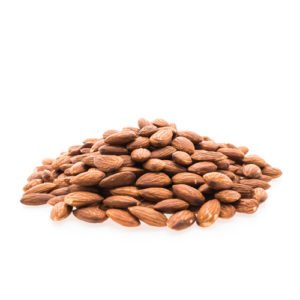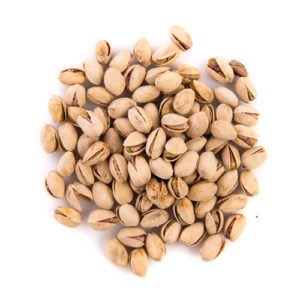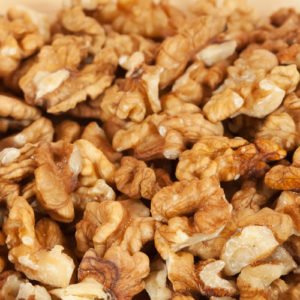Cashews are commonly used in Indian cuisine and Pakistani cuisine, whole for garnishing sweets or curries, or ground into a paste that forms a base of sauces for curries (e.g., korma), or some sweets (e.g., kaju barfi). It is also used in powdered form in the preparation of several Indian sweets and desserts. In Goan cuisine, both roasted and raw kernels are used whole for making curries and sweets.
Regular consumption of cashews can reduce the risks associated with heart disease, high cholesterol, high blood pressure or obesity. Nuts also have a positive effect on stress management, treatment of inflammation, or vascular and arterial activity that promotes healthy heart function. Cashew nuts can lower the level of “bad” LDL cholesterol and improve “good” HDL cholesterol. Nuts contain phytosterol compounds that stabilize cells and prevent cholesterol absorption. Eating nuts, including cashew, reduces the risk of stones in the gallbladder. The disease results from supersaturation of the bile with cholesterol, which circulates throughout the entire digestive tract. In the case of liver problems, the risk of developing gallstones is even greater because the cholesterol released acts as an adhesive to which other substances (eg calcium) bind inside the gallbladder. Nuts have a high fat content, in the case of nut cashews it is almost 46% (Chart 1). At the same time, they are rich in other nutrients, containing a number of minerals and fatty acids that promote weight loss. Cashews will feed you and after eating you will feel full enough to forget the unnecessary overeating and consumption of fast but very unhealthy snacks. Fats in foods enhance the satiety of foods and increase the absorption of fat-soluble nutrients and minerals (for example, vitamin A and vitamin D). The results of scientific studies have shown that people who eat nuts at least twice a week have a significantly lower risk of increased body weight than those who do not eat nuts at all. Regular consumption of nuts, including cashews, is associated with a lower risk of cancer, especially in the digestive tract (liver cancer and colon cancer). Nuts are an excellent source of antioxidants. The British Institute for Cancer Research analysed the effect of nut consumption (almonds, para nuts, cashews, hazelnuts, walnuts, pistachios, pecans and pine nuts) on pancreatic cancer. The results showed that women who ate two or more portions of nuts per week had a significantly lower incidence of the disease. Cashews contain calcium, magnesium and potassium – that is, a large number of substances needed to maintain healthy bones that prevent bone demineralization. In addition, cashews are a great source of vitamin K and already 1/4 cup of cashew provides more than 12% of the recommended daily dose of this vitamin. Vitamin K together with calcium keeps bones in shape, provides them with sufficient mineralization and protects them from fractures or osteoporosis. Proper brain function is dependent on a stable supply of healthy fatty acids from food. Nuts, including cashews, are one of the most natural vegetable foods rich in fats. As a result, they support cognitive functions of the brain, cognitive capabilities of brain processes and mood control. Lack of monounsaturated (MUFA) and polyunsaturated (PUFA) fatty acids can lead to mental disorders, anxiety, depression, dyslexia or even dementia. Cashew nuts are a rich source of monounsaturated fats (MUFA) that slow the release of blood into the bloodstream. The anti-diabetic properties of cashews work thanks to hydro-ethanolic substances in the form of anarcadic acid, which controls the spread of glucose in the body. Sufficient cashew intake also helps prevent arterial hypertension (blood pressure greater than 140/90). In addition to promoting healthy brain function, improving blood circulation while taking care of lowering blood pressure, cashews also contain phytosterols that reduce the duration of headaches. Hypoglycaemia is a well-known trigger of migraine and is also an effective tool in combating headaches caused by sudden changes in blood sugar. The presence of fats in the cashew keeps the skin hydrated enough and the fatty acids protect it from aging without any irritation. In addition to fats, cashews are also an excellent source of copper, which plays an important role in pigment and collagen production. They take care of elastic skin and healthy hair. The presence of magnesium in the cashew nut has positive effects in the fight against increased blood pressure. They are a great source of protein, minerals, magnesium, iron and zinc, thus providing vegetarians with a sufficient intake of all necessary substances. Eating cashews helps maintain healthy gums and teeth. Cashews also have positive effects for the oral cavity. Their chewing causes excessive saliva production, which neutralizes streptococcal bacteria in the mouth. In addition, nuts massage the gums and cleans otherwise hard to reach areas between the teeth.








Reviews
There are no reviews yet.